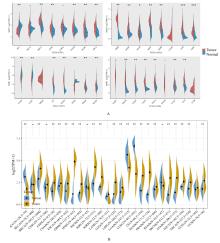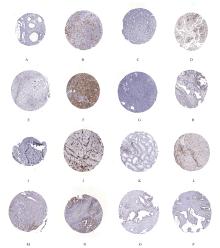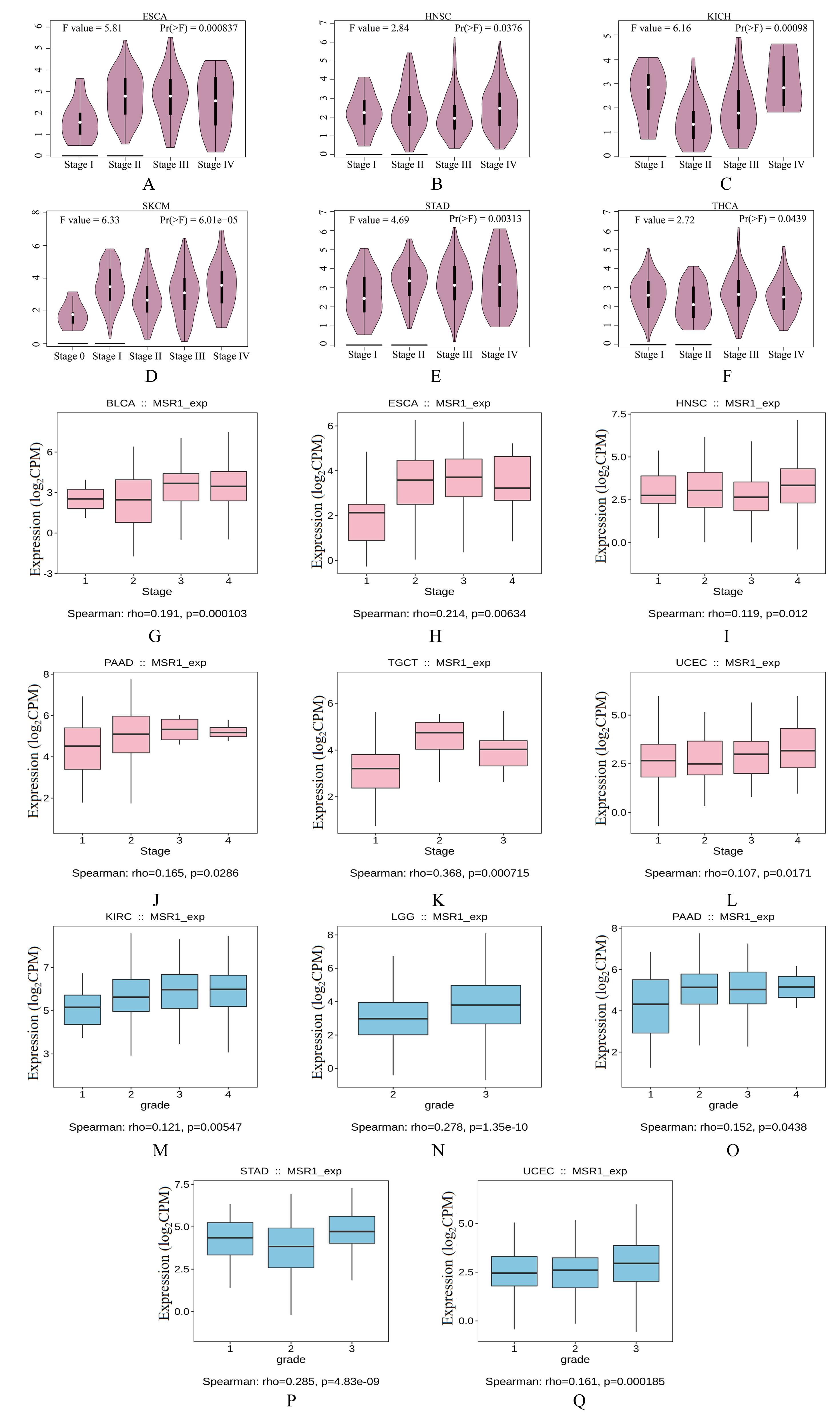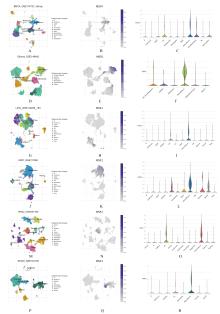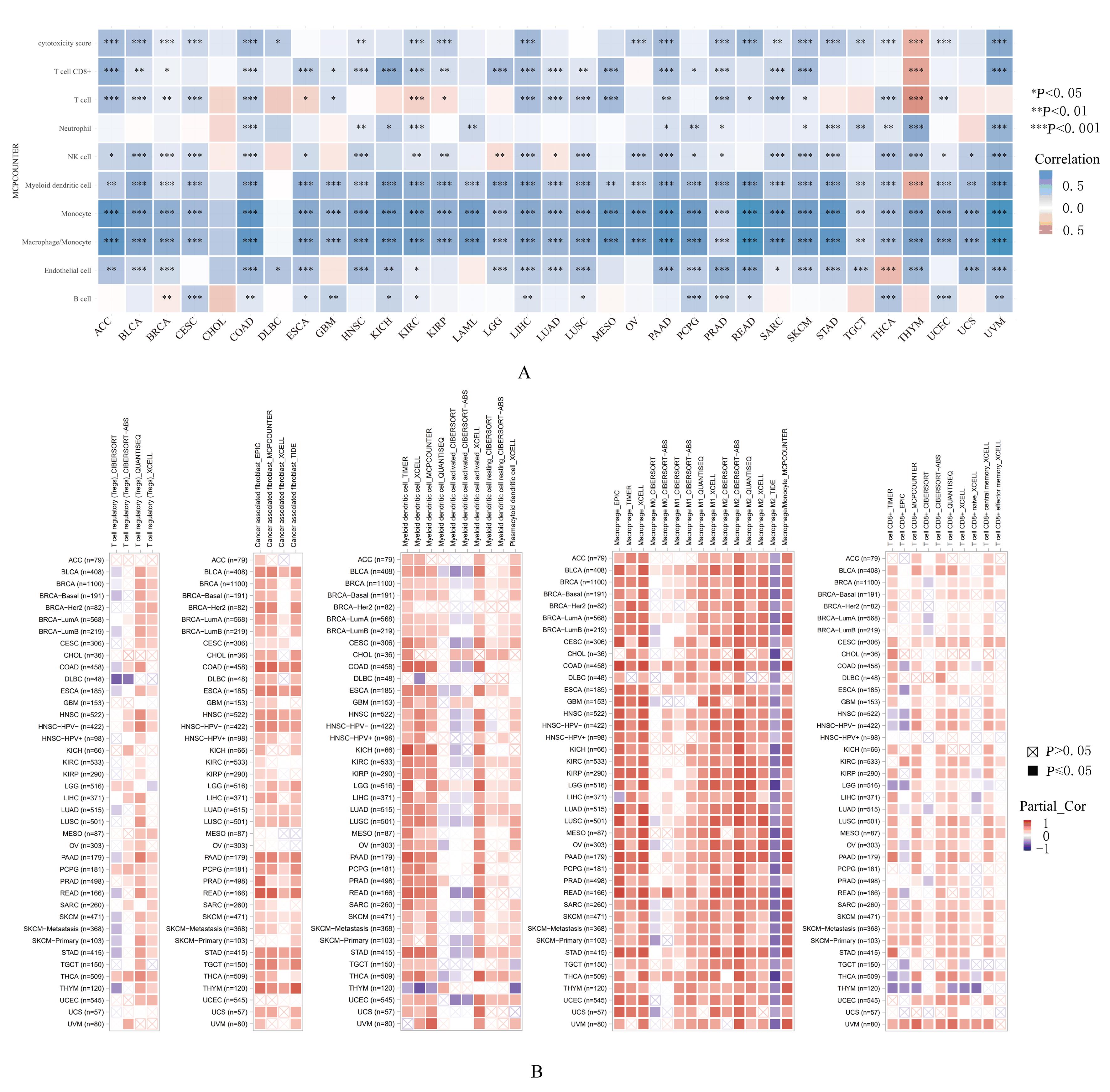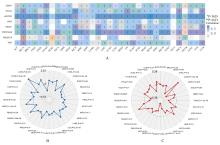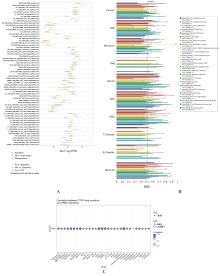Journal of Jilin University(Medicine Edition) ›› 2023, Vol. 49 ›› Issue (2): 425-439.doi: 10.13481/j.1671-587X.20230219
• Research in clinical medicine • Previous Articles Next Articles
Bioinformatics analysis based on expressions of MSR1 mRNA and protein in pan-cancer tissue and its significance
Dehong ZHANG1,Mingzhu ZHENG1,Jiaqiu LI2( ),Zhong LU2
),Zhong LU2
- 1.School of Clinical Medicine,Weifang Medical University,Weifang 261053,China
2.Department of Oncology,Affiliated Hospital of Weifang Medical University,Weifang 261031,China
-
Received:2022-05-27Online:2023-03-28Published:2023-04-24 -
Contact:Jiaqiu LI E-mail:lijq@wfmc.edu.cn
CLC Number:
- R730.3
Cite this article
Dehong ZHANG,Mingzhu ZHENG,Jiaqiu LI,Zhong LU. Bioinformatics analysis based on expressions of MSR1 mRNA and protein in pan-cancer tissue and its significance[J].Journal of Jilin University(Medicine Edition), 2023, 49(2): 425-439.
share this article
| 1 | QIN S, XU L P, YI M, et al. Novel immune checkpoint targets: moving beyond PD-1 and CTLA-4[J]. Mol Cancer, 2019, 18(1): 155. |
| 2 | LIU J F, LICHTENBERG T, HOADLEY K A, et al. An integrated TCGA pan-cancer clinical data resource to drive high-quality survival outcome analytics[J]. Cell, 2018, 173(2): 400-416. |
| 3 | SONG J, TANG Y Y, LUO X Y, et al. Pan-cancer analysis reveals the signature of TMC family of genes as a promising biomarker for prognosis and immunotherapeutic response[J]. Front Immunol, 2021, 12: 715508. |
| 4 | PLÜDDEMANN A, NEYEN C, GORDON S. Macrophage scavenger receptors and host-derived ligands[J]. Methods, 2007, 43(3): 207-217. |
| 5 | HERBER D L, CAO W, NEFEDOVA Y, et al. Lipid accumulation and dendritic cell dysfunction in cancer[J]. Nat Med, 2010, 16(8): 880-886. |
| 6 | JHUNJHUNWALA S, HAMMER C, DELAMARRE L.Antigen presentation in cancer: insights into tumour immunogenicity and immune evasion[J]. Nat Rev Cancer, 2021, 21(5): 298-312. |
| 7 | YI H F, GUO C Q, YU X F, et al. Targeting the immunoregulator SRA/CD204 potentiates specific dendritic cell vaccine-induced T-cell response and antitumor immunity[J].Cancer Res, 2011,71(21):6611-6620. |
| 8 | YU X F, GUO C Q, FISHER P B, et al. Scavenger receptors: emerging roles in cancer biology and immunology[J]. Adv Cancer Res, 2015, 128: 309-364. |
| 9 | FROST F G, CHERUKURI P F, MILANOVICH S, et al. Pan-cancer RNA-seq data stratifies tumours by some hallmarks of cancer[J]. J Cell Mol Med, 2020, 24(1): 418-430. |
| 10 | SUN D Q, WANG J, HAN Y, et al. TISCH: a comprehensive web resource enabling interactive single-cell transcriptome visualization of tumor microenvironment[J].Nucleic Acids Res,2021,49(D1): D1420-D1430. |
| 11 | LI T W, FU J X, ZENG Z X, et al. TIMER2.0 for analysis of tumor-infiltrating immune cells[J]. Nucleic Acids Res, 2020, 48(W1): W509-W514. |
| 12 | ZENG Z X, WONG C J, YANG L, et al. TISMO: syngeneic mouse tumor database to model tumor immunity and immunotherapy response[J]. Nucleic Acids Res, 2022, 50(D1): D1391-D1397. |
| 13 | FU J X, LI K R, ZHANG W B, et al. Large-scale public data reuse to model immunotherapy response and resistance[J]. Genome Med, 2020, 12(1): 21. |
| 14 | LIU C J, HU F F, XIA M X, et al. GSCALite: a web server for gene set cancer analysis[J]. Bioinformatics, 2018, 34(21): 3771-3772. |
| 15 | SUNG H, FERLAY J, SIEGEL R L, et al. Global cancer statistics 2020: GLOBOCAN estimates of incidence and mortality worldwide for 36 cancers in 185 countries[J]. CA Cancer J Clin, 2021, 71(3): 209-249. |
| 16 | PARDOLL D M. The blockade of immune checkpoints in cancer immunotherapy[J]. Nat Rev Cancer, 2012, 12(4): 252-264. |
| 17 | BEAR A S, VONDERHEIDE R H, O’HARA M H. Challenges and opportunities for pancreatic cancer immunotherapy[J]. Cancer Cell, 2020, 38(6): 788-802. |
| 18 | SUZUKI H, KURIHARA Y, TAKEYA M, et al. A role for macrophage scavenger receptors in atherosclerosis and susceptibility to infection[J]. Nature, 1997, 386(6622): 292-296. |
| 19 | NEYEN C, PLÜDDEMANN A, MUKHOPADHYAY S,et al. Macrophage scavenger receptor a promotes tumor progression in murine models of ovarian and pancreatic cancer[J]. J Immunol, 2013, 190(7): 3798-3805. |
| 20 | SHIGEOKA M, URAKAWA N, NAKAMURA T,et al.Tumor associated macrophage expressing CD204 is associated with tumor aggressiveness of esophageal squamous cell carcinoma[J]. Cancer Sci, 2013,104(8): 1112-1119. |
| 21 | OHTAKI Y, ISHII G, NAGAI K J, et al. Stromal macrophage expressing CD204 is associated with tumor aggressiveness in lung adenocarcinoma[J]. J Thorac Oncol, 2010, 5(10): 1507-1515. |
| 22 | HIRAYAMA S, ISHII G, NAGAI K J, et al. Prognostic impact of CD204-positive macrophages in lung squamous cell carcinoma: possible contribution of Cd204-positive macrophages to the tumor-promoting microenvironment[J]. J Thorac Oncol, 2012, 7(12): 1790-1797. |
| 23 | SAADATPOUR A, LAI S J, GUO G J, et al. Single-cell analysis in cancer genomics[J]. Trends Genet, 2015, 31(10): 576-586. |
| 24 | FETAH K L, DIPARDO B J, KONGADZEM E M, et al. Cancer modeling-on-a-chip with future artificial intelligence integration[J].Small, 2019,15(50): e1901985. |
| 25 | HANAHAN D, et al. Hallmarks of cancer: the next generation[J]. Cell, 2011, 144(5): 646-674. |
| 26 | BROADFIELD L A, PANE A A, TALEBI A, et al. Lipid metabolism in cancer: new perspectives and emerging mechanisms[J]. Dev Cell, 2021, 56(10): 1363-1393. |
| 27 | BIAN X L, LIU R, MENG Y, et al. Lipid metabolism and cancer[J]. J Exp Med, 2021, 218(1): e20201606. |
| 28 | RAMAKRISHNAN R, TYURIN V A, VEGLIA F, et al. Oxidized lipids block antigen cross-presentation by dendritic cells in cancer[J]. J Immunol, 2014, 192(6): 2920-2931. |
| 29 | SICA A, LARGHI P, MANCINO A, et al. Macrophage polarization in tumour progression[J]. Semin Cancer Biol, 2008, 18(5): 349-355. |
| 30 | YEUNG O W H, LO C M, LING C C, et al. Alternatively activated (M2) macrophages promote tumour growth and invasiveness in hepatocellular carcinoma[J]. J Hepatol, 2015, 62(3): 607-616. |
| 31 | TOGASHI Y, SHITARA K, NISHIKAWA H. Regulatory T cells in cancer immunosuppression-implications for anticancer therapy[J]. Nat Rev Clin Oncol, 2019, 16(6): 356-371. |
| 32 | KIM J H, KIM B S, LEE S K. Regulatory T cells in tumor microenvironment and approach for anticancer immunotherapy[J]. Immune Netw, 2020, 20(1): e4. |
| 33 | WEI W F, CHEN X J, LIANG L J, et al. Periostin+ cancer-associated fibroblasts promote lymph node metastasis by impairing the lymphatic endothelial barriers in cervical squamous cell carcinoma[J]. Mol Oncol, 2021, 15(1): 210-227. |
| 34 | TUMEH P C, HARVIEW C L, YEARLEY J H,et al. PD-1 blockade induces responses by inhibiting adaptive immune resistance[J].Nature,2014,515(7528):568-571. |
| 35 | CHAN T A, YARCHOAN M, JAFFEE E, et al. Development of tumor mutation burden as an immunotherapy biomarker: utility for the oncology clinic[J]. Ann Oncol, 2019, 30(1): 44-56. |
| 36 | VILAR E, GRUBER S B. Microsatellite instability in colorectal cancer-the stable evidence[J]. Nat Rev Clin Oncol, 2010, 7(3): 153-162. |
| 37 | WANG X Y, FACCIPONTE J, CHEN X, et al. Scavenger receptor-A negatively regulates antitumor immunity[J]. Cancer Res, 2007, 67(10): 4996-5002. |
| [1] | Xiaohui WU,Fan YANG,Xinru GUO,Ke YUAN,Zongyi MA,Ting LIAN,Rajiv Kumar JHA. Effect of Orlistat combined with EZH2 inhibitor GSK126 on lipid metabolism reprogramming in pancreatic cancer cells [J]. Journal of Jilin University(Medicine Edition), 2023, 49(1): 55-66. |
| [2] | Junjie HOU,Xuguang MI,Xiaonan LI,Xiaonan LI,Ying YANG,Xiaodan LU,Yanqiu FANG,Ningyi JIN. Establishment and evaluation of prognostic model of lung adenocarcinoma based on lactate metabolism gene [J]. Journal of Jilin University(Medicine Edition), 2022, 48(6): 1546-1554. |
| [3] | Qing YAO,Dan WANG,Xiaoshuang WANG,Yingjie WU,Liyuan RAN. Effect of ovariectomy on glucose and lipid metabolism in hyperinsulinemia MKR mice [J]. Journal of Jilin University(Medicine Edition), 2022, 48(5): 1229-1237. |
| [4] | Shuang HUANG,Chen CHEN,Bo HUANG. Effects of limonin on lipid metabolism and intestinal flora in nutritionally obese rats [J]. Journal of Jilin University(Medicine Edition), 2022, 48(4): 858-865. |
| [5] | Weigang WANG,Xiaohong LI,Bing LIU,Tao DING,Kang WEI,Jianming TIAN. Effect of genistein chromium complex on glucose and lipid metabolism in obese rats induced by sodium glutamate [J]. Journal of Jilin University(Medicine Edition), 2022, 48(4): 892-897. |
| [6] | Ying ZHAO,Danyu ZHAO,Chao LIU. Bioinformatics analysis on prognostic evaluation value of TXNDC11 gene in pan-cancer and its immunity regulation [J]. Journal of Jilin University(Medicine Edition), 2022, 48(1): 142-153. |
| [7] | ZHANG Yezhuo, YANG Yuefeng, YANG Yetong, ZHANG Ying, LIU Yajuan. Effects of poria cocos compound extract on blood glucose and lipid levels in rats with type 2 diabetes mellitus [J]. Journal of Jilin University(Medicine Edition), 2020, 46(05): 937-941. |
| [8] | WANG Dan, LIAO Dan, LI Hong, XIONG Liqiu, WU Ying, DONG Ying, GAI Xiaodong. Expressions of plasmacytoid dendritic cells and Foxp3+ regulatory T cells in colorectal cancer tissue and their significances [J]. Journal of Jilin University(Medicine Edition), 2020, 46(04): 834-838. |
| [9] | FENG Lei, ZHANG Hante, LI Xiang, MENG Fanping, LI Yan. Promotion effect of IL-4 and estradiol on growth of breast cancer cells in mice and its mechanism [J]. Journal of Jilin University(Medicine Edition), 2020, 46(03): 536-542. |
| [10] | ZOU Jun, CHEN Bing, FANG Minghui, HU Zheng. Establishment and identification of humanized mouse models with human immune system and allogeneic human melanoma growth [J]. Journal of Jilin University(Medicine Edition), 2019, 45(03): 718-724. |
| [11] | WANG Yanli, HUANG Mingyu, ZHANG Peng. Effects of atorvastatin on expression of lipid metabolism-related genes in HepG2 cells [J]. Journal of Jilin University(Medicine Edition), 2019, 45(01): 77-82. |
| [12] | SU Han, ZHANG Meijia, WANG Huaijie, LI Na, HUO Lianguang, LI Guizhi, DAI Gong, GAO Zhiqin, YANG Xiaoyun, QU Meihua. Effects of Exendin-4 on expressions of lipid metabolism related genes in HepG2 cells with insulin resistance [J]. Journal of Jilin University Medicine Edition, 2018, 44(01): 36-40. |
| [13] | WANG Jianan, FENG Hui, WANG Qian, HE Yueming, SONG Yanqiu, ZHU Jihong. Killer effect of natural killer cells combined with tamoxifen on breast cancer cells in vitro and its mechanism [J]. Journal of Jilin University Medicine Edition, 2017, 43(02): 281-287. |
| [14] | WANG Ruibin, HE Dongyun, ZOU Jiyan, SHENG Minjia. Influence of DC-CIK immunotherapy in blood coagulation function and D-dimer levels in patients with ovarian cancer [J]. Journal of Jilin University Medicine Edition, 2017, 43(01): 120-124. |
| [15] | BAO Shuyin, HAN Shuying, WANG Hugejiletu, BAO Wenshan, AO·Wuliji. Improvement effects of agiophyllum oligosaccharides on general characterization and glucose and lipid metabolism of diabetic GK rats [J]. Journal of Jilin University Medicine Edition, 2016, 42(06): 1059-1065. |
|
||
